- Home
- Blake Pierce
The Perfect Disguise (A Jessie Hunt Psychological Suspense Thriller—Book Ten) Page 4
The Perfect Disguise (A Jessie Hunt Psychological Suspense Thriller—Book Ten) Read online
Page 4
Whoever kills one life kills the world entire, and whoever saves one life saves the world entire.
Jessie stared at it for a long time. Though he’d never said it out loud, it was clear that, in his own grumbly, unassuming way, this had been his maxim. He’d lived it, even if he never spoke it. She wondered what he’d think of her deleting Captain Decker’s voice message. Would he shake his head in gentle disappointment? What would Ryan say if he could speak right now?
Before she knew what she was doing, Jessie had picked up her phone and dialed Decker’s number.
CHAPTER FIVE
Jessie could tell people were surprised to see her.
As she walked through the station bullpen toward Decker’s office, she thought she caught a few dirty looks too. She pretended not to notice.
When she’d left the department, she’d been formally cleared of having posted racist Facebook comments. Evidence showed that her account, rarely used, had been hacked. But some of her former co-workers clearly still had their doubts. She suspected that was the reason for the nasty glances. But most people just looked shocked to see her three days after she’d officially parted ways with the LAPD.
She knocked on Decker’s door, which was slightly ajar, and waited for a response. Despite her better judgment, she glanced over at the Homicide Special Section unit’s work area. It was currently empty, which suggested everyone was out working a case. Her old desk was bare. Facing it was Ryan’s, which was still covered in papers, as if he’d just left them there to take a coffee break and would be back at any moment.
“Come in,” called out a familiar voice.
She stepped into the office and closed the door behind her. There were two people in the room. Captain Roy Decker stood up behind his desk. He looked somehow appreciably older than when she’d seen him on Friday—tall and skinny, his sunken chest seeming to collapse in on itself. He was sixty but the deep creases in his face made him look closer to seventy. Atop his head, a very few unruly wisps of gray hair clung desperately to his scalp.
Despite all that, he was still somehow formidable. He wore a crisply starched suit and tie, as if he was about to walk into a Fortune 500 company boardroom. His prominent nose twitched slightly, as if actually smelling evidence at that very moment. And his beady, hawklike eyes bored into her, taking stock of her with just one glance.
“Good to see you, Hunt,” he said. “Thanks for coming in. I know Trembley here was glad when I told him.”
Jessie glanced over at Detective Alan Trembley, who was just getting up from the worn-out couch along the wall. Even though they’d both started working at Central Station around the same time two years ago, Jessie couldn’t help but think of him as a rookie. Maybe that was just because he seemed so inexperienced in comparison to Ryan. Or maybe it was because he looked like a full-sized man-child.
Trembley was twenty-nine, only a year younger than Jessie, but he looked like he might still be in college. His curly blond hair was unruly, his glasses were smudged, and his sports coat looked at least two sizes too big, as if he’d borrowed it from his dad. As he stood up, he nervously half-stumbled on his scuffed loafers.
“Hey, Jessie,” he said with a sheepish smile. “Appreciate you helping out.”
“How’s it going, Trembley?” she asked.
“Oh, you know, bananas as usual.”
“Right,” she said, returning her attention to Decker. “So before we go any further, I just want to be clear. I came to hear you out. I’m not making any commitment here. Just so we’re all on the same page.”
Decker nodded.
“I wouldn’t have asked at all but we’re up against it. The entire HSS unit, save for Trembley, is already tied up with other cases. Detective Reid is dealing with two bodies found in L.A. State Park. It looks like they were cut up and the body parts crudely buried all over the area. So that’s fun.”
Jessie said nothing, getting the distinct sense that he wasn’t done. She was right.
“Detective Pointer is handling a spree killing near L.A. Live,” he continued. “With Hernandez indisposed, we even pulled Parker over from Vice to help her out. And with Moses’s passing and your departure, we have a request in for a profiler from another division to help out. We haven’t heard back yet. But to be honest, after having you and Moses at our disposal, I’m not all that excited to bring in the B-team.”
“Understood,” Jessie replied, refusing to be guilted into promising anything. “So what’s the case?”
“I’m going to give you the short version,” Decker answered. “That’s because even though a detective team from Hollywood Station is already on the scene, the folks there are demanding HSS take over.”
“The folks there are demanding?” Jessie repeated incredulously. “I thought you decided what cases Special Section took on.”
“I would have taken this case even if we weren’t asked,” he assured her. “Here’s why: the victim is the actress Corinne Weatherly. Are you familiar with her?”
Jessie searched her memory.
“I know who she is but I can’t say that I’m all that familiar with her work; maybe one or two movies.”
“Trembley can fill you in on that on the way over, assuming you sign on. But it appears she was killed—strangled—on the Sovereign Studios lot sometime last night after she wrapped shooting for the day on a movie. She was only found this morning. Initial indications are that she was killed in her trailer and then moved to the prop department. Apparently when the head moulage artist discovered the body, he didn’t even realize it was real at first. Weatherly was shooting a horror film and the department was littered with fake dead bodies. You can imagine how freaked out he was once he figured out she was both real and dead.”
“What’s a moulage artist?” Jessie said.
Trembley stepped in.
“It’s the name for a special effects and makeup person who makes fake wounds and gore look realistic.”
“Okay,” she said, wincing. “Sounds disgusting.”
Trembley looked surprised by her response.
“It’s hard to believe that a criminal profiler who deals with real-life brutality would be so grossed out by someone who creates fake injuries,” he noted.
“Touché, Trembley,” Jessie said.
“Regardless,” Decker interrupted impatiently, “the studio executives are making a fuss. Word is already starting to leak out about who the victim is and they want to be able to tell the public that LAPD’s most specialized homicide unit is handling the situation. That’s not unreasonable, but if we don’t go into the case without our best folks, it reflects poorly on the unit and on me. No offense to Trembley here, but Ryan Hernandez is the top detective in the unit and with Moses dead, you are easily the top profiler we have.”
“Had,” Jessie corrected.
“Had,” he conceded. “So if I don’t have Hernandez, I at least need you. This is just too high profile to entrust to second-tier folks.”
Jessie didn’t like the implication.
“So if the victim was just a random grocery clerk from Hollywood, you’d be okay with the—what was the term, ‘second-tier’ investigators?”
“Don’t give me a hard time, Hunt. If it was a grocery clerk, we’d never have been called in the first place. You know what HSS does. This is our specialty. So are you willing to help out?”
Decker had started out the sentence sounding crotchety, but by the end his voice was near-pleading. As far as she could recall, that was a first for him. She couldn’t help but feel some sympathy. In that moment, despite all the red lights warning her against it, she knew she’d say yes.
“If I agree to this,” she began, “it would be a one-time thing, in a consulting capacity, like Garland used to do. I’m not an LAPD employee and there’s no expectation that I continue beyond this case. Fair?”
“Fair,” Decker said immediately.
“I’ve got teaching interviews lined up at multiple universities next week. I’m no
t missing them, whether this thing is solved or not. I’m not upending my life for this, Captain. That’s the whole reason I left in the first place. Are we clear?”
“Crystal,” he said, a smile starting to form at his lips.
“And Trembley here has to step up,” she added. “No goober moments.”
The detective’s face fell but he said nothing.
“I can’t promise that,” Decker admitted wryly.
“I can,” Trembley interjected, recovering quickly.
Jessie looked at him, giddy with enthusiasm, almost bouncing out of his shoes. In that moment, he was the epitome of gooberism.
“Let’s go,” she sighed. “You’re driving.”
CHAPTER SIX
They had only been in the car for five minutes when Jessie began to regret her decision.
Trembley was talking a mile a minute, bouncing from one topic to another without any seeming coherence.
“Trembley,” she finally interrupted. “Calm down.”
“Sorry,” he said.
She glanced down at her buzzing phone and saw that Hannah had replied to her text saying she was helping out on a case with a solitary mad-face emoji. Explaining her decision later tonight was going to be brutal. Kat had yet to respond.
“Let’s just go over what we know about Corinne Weatherly and this film,” she said. “I assume you have details?”
“Yeah,” he said with unbridled enthusiasm before lowering it a notch. “I mean, yes. How familiar are you with her?”
“I’m not a huge fan. I know she did the romance film a while back and then those horror movies. And she was in some crappy cop show a while back. That’s about it.”
“You’ve hit the highlights,” Trembley confirmed, now seemingly in control of his energy level. “She had a bunch of small roles before she broke out with the romantic comedy Petals and Petulance. Then she got the lead in the horror movie Marauder. But she didn’t have many hits after that. She did the Marauder sequel, which sucked. She was in a lot of other stuff over the next few years. Some of it looked like it would be good but ended up being crap. She was on that series Tacoma Profilers. I would have thought you’d watched that.”
“I think that was on when I was getting my master’s in forensic psychology. I didn’t have time to watch much of anything back then.”
“You didn’t miss that much,” Trembley conceded. “It was set in Tacoma but they shot it in Vancouver. It only lasted three years. After that, she did a lot of junk. I won’t bore you with the details. This was supposed to be her big comeback. It was another Marauder movie, but it was going to be a reset of some kind. They got some fancy foreign director. I was actually curious to check it out. I don’t know what they’re going to do now.”
“Are the Hollywood Station detectives okay with us taking over?” she asked.
“I talked to one of them before you got to the station—her name’s Bray. She sounded a bit put out but I got the sense she’s also a little relieved. I don’t think they want the heat this case is going to generate. I mean, this is pretty huge.”
Jessie gave him a sidelong glance.
“You sure you can handle this, Trembley? I can’t have you going gaga over a bunch of celebrities. You need to keep your professional distance. Can you do that?”
He looked mildly offended.
“Of course,” he said.
Jessie wasn’t entirely convinced.
*
When they arrived at Sovereign Studios, Jessie noticed a small memorial had been set up by the gate near the main entrance. It was only four people with a few candles and posters. She didn’t know if that meant Weatherly wasn’t that popular or if word hadn’t gotten out yet.
A portly, kind-faced studio security guard named Paul was waiting for them. He directed them to the guest lot, followed them to their parking spot in a golf cart, and offered them seats.
“We have to cross half the lot,” he said by way of explanation. “It’s a long walk.”
They got in and he sped off along the cobblestone path. Jessie, who had gone to college at USC and spent most of her twenties living in the city, had never been awed by being in the center of the cinematic universe. But she had to admit that it was pretty cool to be spirited through a facility where movies had been made for nearly a hundred years. As they zipped along, they passed a large, sunken, walled-in outdoor parking lot with a huge, sky-colored screen at the back of it.
“What’s that?” Jessie asked, pointing.
Paul the security guard followed her finger and smiled.
“When a production needs to do a water shoot in a secure environment, they can use that. They fill up the parking lot with water so it acts like one huge water tank. Then they can project whatever background they want on the screen and boom, you’re in the middle of the ocean if you like.”
Trembley looked over at her with a “that’s awesome” expression. She gave him a stern glare in return to remind him to rein it in. But he nearly lost it when the cart passed the tank and he saw what was behind it. They were driving through a re-creation of multiple sections of New York City.
A bodega storefront stood next to a pizzeria. They passed a subway station sign and Trembley stood up in the cart to see how far down the stairs really went. Behind the facades, Jessie noticed that there was nothing but scaffolding and empty space. They rounded a corner and the entire look of the new street changed.
“What part of the city is this supposed to be?” Trembley asked, unable to contain himself.
“This stretch is the Lower East Side,” Paul the guard told him as they passed a collection of brownstones. “But other blocks are done up like Greenwich Village, the Financial District, even Brooklyn. We have a Chicago street too. The crime scene is over by SoHo.”
That last line drained some of the zeal out of Trembley’s face. He went quiet. A few seconds later, they pulled up at the back of the faux neighborhood next to a massive soundstage with a “32” painted on it.
“We’re here,” Paul said as if that wasn’t obvious from the crowd of people milling around behind the police tape that had been set up near the soundstage.
“Paul, can I ask you something?” Jessie probed.
“You can ask anything. I don’t promise I have the answers though.”
“I don’t know about that,” she countered. “You seem like the kind of guy who knows what’s going on around here. How long have you worked on the lot?”
“Eight years,” he said. “I was at Sony for seven before that. I guess I’m turning into a lifer.”
“So you know how these places operate,” she said. “What’s the overnight security like here? Hardcore or more relaxed?”
“It depends. There’s always some staff. We typically shut down the side gates around midnight. But the main gate is always manned. And there are guards walking the lot all night long. But if there are active shoots overnight, we obviously staff up more.”
“Were there overnight shoots last night?” she asked.
“Everything was scheduled to wrap by eleven p.m. except the production right here, the Marauder feature. But they ended up wrapping early on that too so we pared back to the standard crew.”
“Do you know why they wrapped early?” Trembley asked.
Paul shifted uncomfortably from foot to foot.
“Come on, Paul,” Jessie cajoled. “You know why we’re here. And you know those studio suits are going to give us the party line. A guy like you, with your ear to the ground, has got to know the real story.”
Paul, whether due to the flattery or an inability to contain himself, caved.
“Officially, there were technical issues with the sequence they wanted to complete. Unofficially, I heard that Ms. Weatherly got pissed at her co-star, Terry Slauson; said he was too rough with her in the scene they were shooting.”
“Was he?” Jessie asked.
Paul shrugged.
“I wasn’t there so I couldn’t say for certain. But truth b
e told, and I don’t like to speak ill of the dead, Ms. Weatherly was always going off on someone for something. She screamed at me just last week for taking a turn too fast in this very cart; called me a fat f… never mind. Let’s just say that not all of her complaints were justified.”
Trembley seemed crestfallen at Paul’s description of the actress. Jessie tried to keep her annoyance in check and focused on Paul.
“What about stalkers? Are you guys notified if a performer has been threatened? Do you get photos or restraining orders?”
“Not automatically,” he told her. “But usually a member of the performer’s team will make us aware if there’s an issue. We’ve had a few crazies try to get on the lot from time to time.”
“Did Corinne Weatherly’s team—maybe a bodyguard—ever make you aware of any issues?”
Paul chuckled before catching himself.
“I’m sorry. That was thoughtless. It’s just that Ms. Weatherly didn’t have a team with her, much less a bodyguard. The production assigned her an assistant. But she wasn’t really in a position to have a traveling team, if you get my meaning. Besides, if anyone was harassing her, I promise you that Ms. Weatherly would have brought it to our attention personally and forcefully.”
Jessie nodded. Trembley, to her surprise, spoke up.
“So you say she didn’t have a bodyguard. She just walked around the lot on her own?”
“Sure,” Paul said, a bit taken aback. “That’s one of the reasons that productions shoot on studio lots in the first place. I mean, part of it is to have a more controlled shooting environment where you have most everything you need easily accessible. But it’s also more secure. In theory, everyone on a back lot is authorized to be there. It’s a workplace, just like a glorified office building. That means that folks, even super famous ones, can usually move about hassle-free. I’ve seen mega-stars in line at the commissary waiting for chicken fingers and big-time producers carrying boxes of scripts to their cars. It’s supposed be a safe place. It usually is. Unfortunately, we’ve had a few issues this morning with the paparazzi trying to hop the fence so they could snap a few candid photos near the stage here. We managed to snag them all though.”

_preview.jpg) Once Gone (a Riley Paige Mystery--Book #1)
Once Gone (a Riley Paige Mystery--Book #1)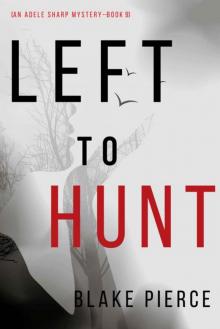 Left to Hunt (An Adele Sharp Mystery—Book Nine)
Left to Hunt (An Adele Sharp Mystery—Book Nine) Left to Kill (An Adele Sharp Mystery—Book Four)
Left to Kill (An Adele Sharp Mystery—Book Four)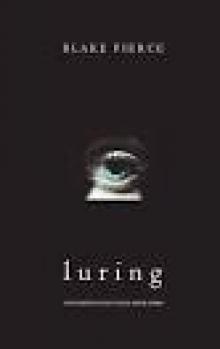 LURING
LURING If She Hid
If She Hid If She Fled
If She Fled Already Gone (A Laura Frost FBI Suspense Thriller—Book 1)
Already Gone (A Laura Frost FBI Suspense Thriller—Book 1) Vengeance in Vienna
Vengeance in Vienna Once Shunned
Once Shunned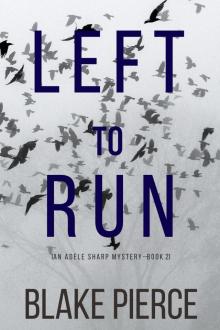 Left To Run
Left To Run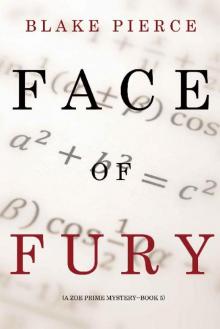 Face of Fury (A Zoe Prime Mystery--Book 5)
Face of Fury (A Zoe Prime Mystery--Book 5) Blake Pierce - Kate Wise - 5 - If She Fled
Blake Pierce - Kate Wise - 5 - If She Fled IF SHE RAN
IF SHE RAN Left to Envy (An Adele Sharp Mystery—Book Six)
Left to Envy (An Adele Sharp Mystery—Book Six) Silent Neighbor
Silent Neighbor Her Last Wish (A Rachel Gift FBI Suspense Thriller—Book 1)
Her Last Wish (A Rachel Gift FBI Suspense Thriller—Book 1) Almost Lost
Almost Lost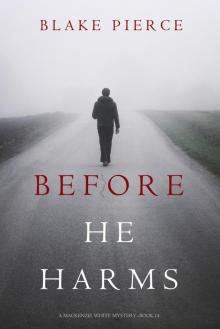 Before He Harms
Before He Harms Murder (and Baklava) (A European Voyage Cozy Mystery—Book 1)
Murder (and Baklava) (A European Voyage Cozy Mystery—Book 1) Left to Vanish (An Adele Sharp Mystery—Book Eight)
Left to Vanish (An Adele Sharp Mystery—Book Eight) THE PERFECT IMAGE
THE PERFECT IMAGE The Perfect Affair (A Jessie Hunt Psychological Suspense Thriller—Book Seven)
The Perfect Affair (A Jessie Hunt Psychological Suspense Thriller—Book Seven)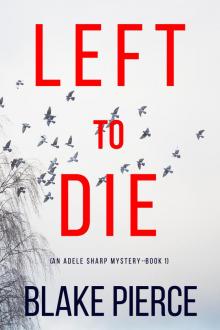 Left To Die
Left To Die BEFORE HE LAPSES
BEFORE HE LAPSES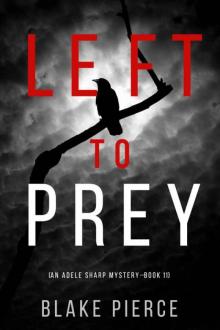 Left to Prey (An Adele Sharp Mystery—Book Eleven)
Left to Prey (An Adele Sharp Mystery—Book Eleven) The Perfect Neighbor (A Jessie Hunt Psychological Suspense Thriller—Book Nine)
The Perfect Neighbor (A Jessie Hunt Psychological Suspense Thriller—Book Nine)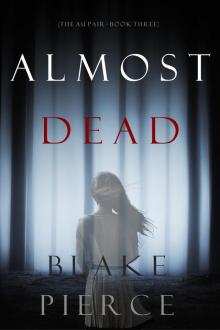 Almost Dead
Almost Dead The Perfect Wife
The Perfect Wife The Perfect Smile
The Perfect Smile If She Saw
If She Saw Left To Die (An Adele Sharp Mystery—Book One)
Left To Die (An Adele Sharp Mystery—Book One)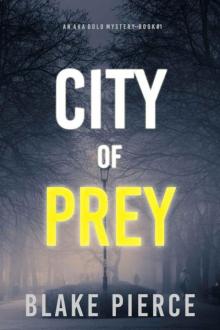 City of Prey: An Ava Gold Mystery (Book 1)
City of Prey: An Ava Gold Mystery (Book 1)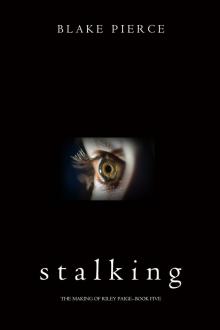 Stalking
Stalking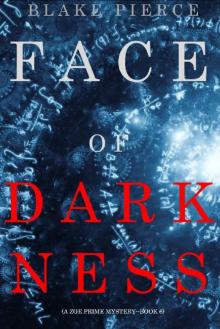 Face of Darkness (A Zoe Prime Mystery—Book 6)
Face of Darkness (A Zoe Prime Mystery—Book 6) The Perfect Mistress (A Jessie Hunt Psychological Suspense Thriller—Book Fifteen)
The Perfect Mistress (A Jessie Hunt Psychological Suspense Thriller—Book Fifteen) Girl, Vanished (An Ella Dark FBI Suspense Thriller—Book 5)
Girl, Vanished (An Ella Dark FBI Suspense Thriller—Book 5) The Perfect Block
The Perfect Block Left to Fear (An Adele Sharp Mystery—Book Ten)
Left to Fear (An Adele Sharp Mystery—Book Ten) Almost Gone (The Au Pair—Book One)
Almost Gone (The Au Pair—Book One) The Perfect Facade (A Jessie Hunt Psychological Suspense Thriller—Book Twelve)
The Perfect Facade (A Jessie Hunt Psychological Suspense Thriller—Book Twelve) The Perfect Affair
The Perfect Affair Once Chosen (A Riley Paige Mystery—Book 17)
Once Chosen (A Riley Paige Mystery—Book 17) Girl, Alone (An Ella Dark FBI Suspense Thriller—Book 1)
Girl, Alone (An Ella Dark FBI Suspense Thriller—Book 1)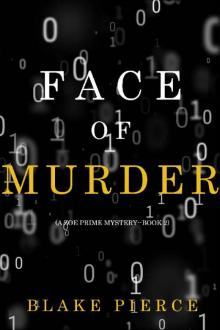 Face of Murder (A Zoe Prime Mystery—Book 2)
Face of Murder (A Zoe Prime Mystery—Book 2) The Perfect Mistress
The Perfect Mistress Crime (and Lager) (A European Voyage Cozy Mystery—Book 3)
Crime (and Lager) (A European Voyage Cozy Mystery—Book 3)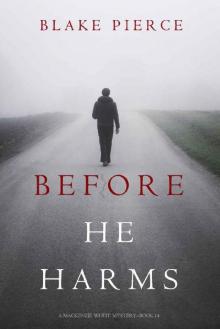 Before He Harms (A Mackenzie White Mystery—Book 14)
Before He Harms (A Mackenzie White Mystery—Book 14)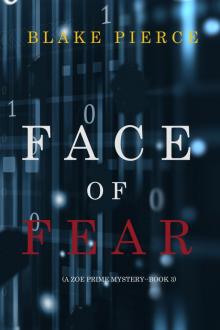 Face of Fear
Face of Fear Left to Murder (An Adele Sharp Mystery—Book Five)
Left to Murder (An Adele Sharp Mystery—Book Five) Left to Vanish
Left to Vanish The Perfect Secret (A Jessie Hunt Psychological Suspense Thriller—Book Eleven)
The Perfect Secret (A Jessie Hunt Psychological Suspense Thriller—Book Eleven) The Perfect Deceit (A Jessie Hunt Psychological Suspense Thriller—Book Fourteen)
The Perfect Deceit (A Jessie Hunt Psychological Suspense Thriller—Book Fourteen)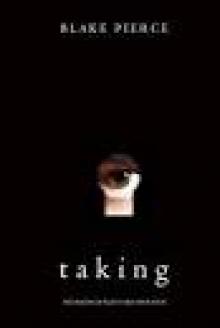 Blake Pierce - The Making of Riley Paige - 4 - Taking
Blake Pierce - The Making of Riley Paige - 4 - Taking Death (and Apple Strudel) (A European Voyage Cozy Mystery—Book 2)
Death (and Apple Strudel) (A European Voyage Cozy Mystery—Book 2) THE PERFECT HOUSE
THE PERFECT HOUSE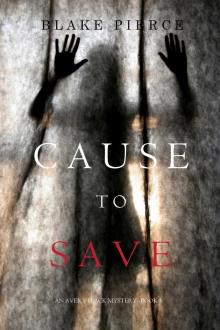 Cause to Save
Cause to Save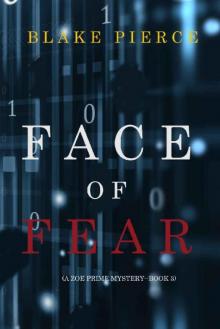 Face of Fear (A Zoe Prime Mystery—Book 3)
Face of Fear (A Zoe Prime Mystery—Book 3)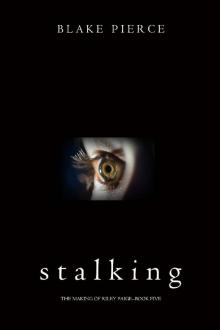 Stalking (The Making of Riley Paige—Book 5)
Stalking (The Making of Riley Paige—Book 5) A Neighbor's Lie
A Neighbor's Lie The Perfect Neighbor
The Perfect Neighbor Once Dormant
Once Dormant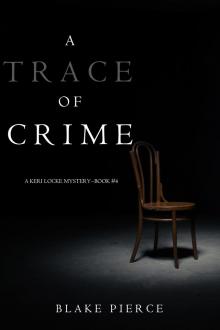 A Trace of Crime
A Trace of Crime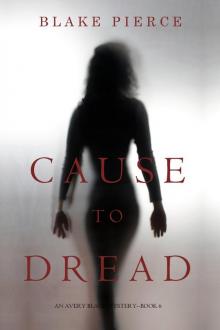 CAUSE TO DREAD
CAUSE TO DREAD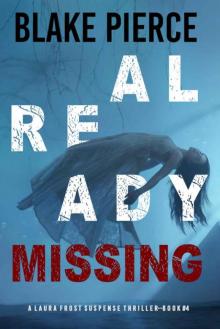 Already Missing (A Laura Frost FBI Suspense Thriller—Book 4)
Already Missing (A Laura Frost FBI Suspense Thriller—Book 4) Waiting
Waiting If She Knew
If She Knew If She Feared (A Kate Wise Mystery—Book 6)
If She Feared (A Kate Wise Mystery—Book 6)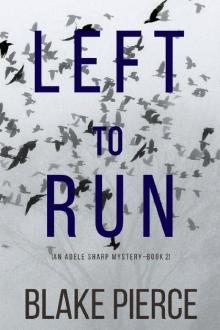 Left To Run (An Adele Sharp Mystery—Book Two)
Left To Run (An Adele Sharp Mystery—Book Two)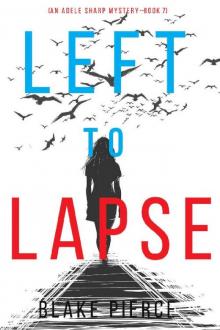 Left to Lapse (An Adele Sharp Mystery—Book Seven)
Left to Lapse (An Adele Sharp Mystery—Book Seven) If She Hid (A Kate Wise Mystery—Book 4)
If She Hid (A Kate Wise Mystery—Book 4) The Perfect Alibi (A Jessie Hunt Psychological Suspense Thriller—Book Eight)
The Perfect Alibi (A Jessie Hunt Psychological Suspense Thriller—Book Eight)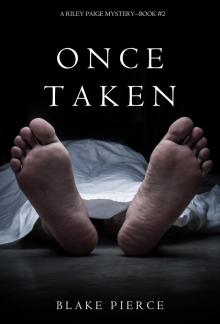 Once Taken
Once Taken Before He Envies
Before He Envies Before He Sins
Before He Sins Mackenzie White 07-Before He Sins
Mackenzie White 07-Before He Sins ONCE BOUND
ONCE BOUND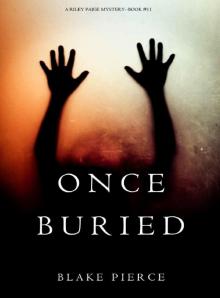 Once Buried
Once Buried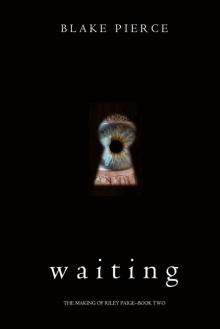 Waiting (The Making of Riley Paige—Book 2)
Waiting (The Making of Riley Paige—Book 2)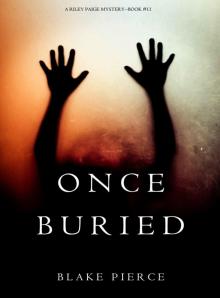 Riley Paige 11-Once Buried
Riley Paige 11-Once Buried Once Forsaken (A Riley Paige Mystery—Book 7)
Once Forsaken (A Riley Paige Mystery—Book 7)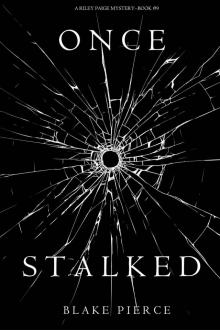 Once Stalked (A Riley Paige Mystery—Book 9)
Once Stalked (A Riley Paige Mystery—Book 9) The Perfect Disguise (A Jessie Hunt Psychological Suspense Thriller—Book Ten)
The Perfect Disguise (A Jessie Hunt Psychological Suspense Thriller—Book Ten)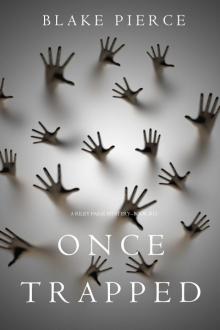 ONCE TRAPPED
ONCE TRAPPED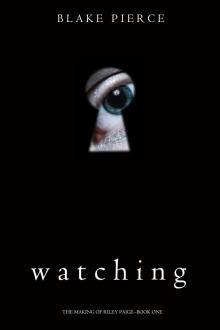 Watching
Watching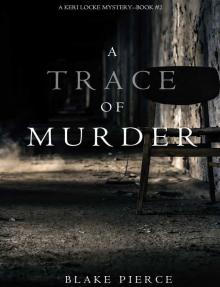 Keri Locke 02-A Trace of Muder
Keri Locke 02-A Trace of Muder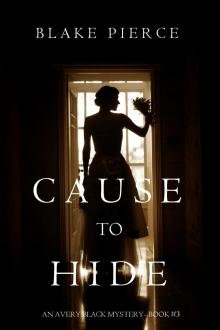 Cause to Hide
Cause to Hide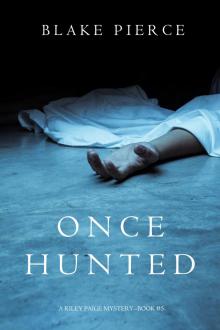 Once Hunted
Once Hunted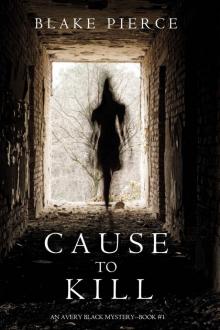 Cause to Kill (An Avery Black Mystery—Book 1)
Cause to Kill (An Avery Black Mystery—Book 1)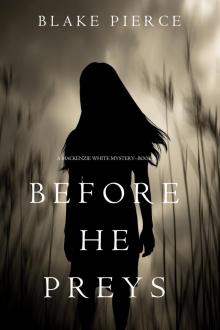 Before He Preys
Before He Preys Once Pined
Once Pined A Trace of Hope
A Trace of Hope Once Craved (a Riley Paige Mystery--Book #3)
Once Craved (a Riley Paige Mystery--Book #3)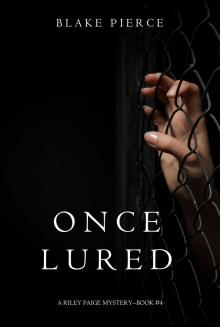 Once Lured
Once Lured Before He Sees (A Mackenzie White Mystery—Book 2)
Before He Sees (A Mackenzie White Mystery—Book 2) Before he Kills (A Mackenzie White Mystery—Book 1)
Before he Kills (A Mackenzie White Mystery—Book 1)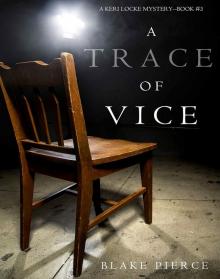 Keri Locke 03-A Trace of Vice
Keri Locke 03-A Trace of Vice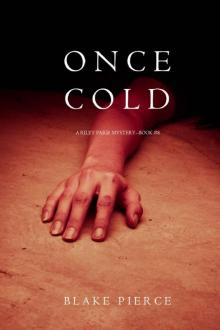 Once Cold
Once Cold ONCE LOST
ONCE LOST Before He Takes
Before He Takes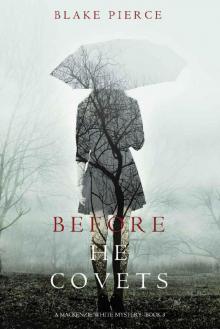 Before He Covets (A Mackenzie White Mystery—Book 3)
Before He Covets (A Mackenzie White Mystery—Book 3) BEFORE HE NEEDS
BEFORE HE NEEDS